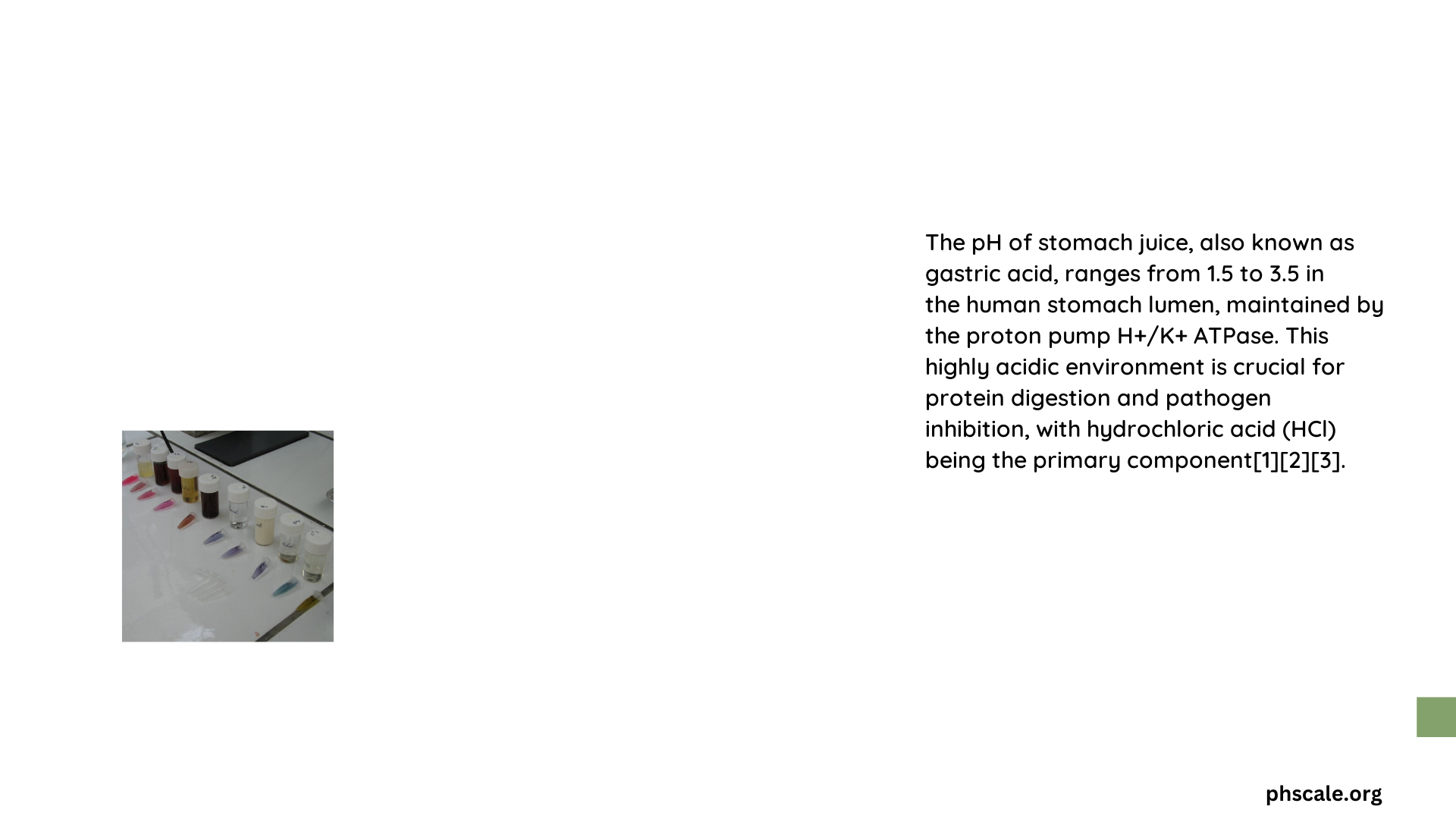Stomach juice pH plays a crucial role in digestion and overall health. The stomach’s acidic environment, typically ranging from pH 1 to 3, is essential for breaking down food, activating digestive enzymes, and protecting against harmful microorganisms. This article explores the intricacies of stomach juice pH, its effects on digestion, and factors that influence gastric acid balance.
What Is the Exact pH Level of Stomach Juice?
Stomach juice, also known as gastric juice, has a highly acidic pH level. Here’s a breakdown of the pH ranges:
- Pure stomach acid (hydrochloric acid): pH 1
- Gastric juice (including water, mucus, and other components): pH 1.5 to 3.5
This acidic environment is crucial for various digestive processes and serves as a barrier against pathogens.
How Does Stomach Juice pH Affect Digestion?

The pH level of stomach juice significantly impacts the digestion of various nutrients:
- Proteins:
- Optimal pH for pepsin activation: Around 2
- Low pH activates pepsinogen to pepsin
-
Pepsin breaks down proteins into smaller peptides
-
Fats:
- Gastric lipase functions in acidic environment
-
Acid helps emulsify fats for easier breakdown
-
Carbohydrates:
- Limited direct impact on carbohydrate digestion
-
Prepares food for further digestion in small intestine
-
Vitamins and Minerals:
- Essential for absorption of:
- Vitamin B12
- Iron
- Calcium
- Magnesium
Table: Impact of Stomach pH on Nutrient Absorption
| Nutrient | Optimal pH | Effect of Low pH |
|---|---|---|
| Proteins | 1.5-3.5 | Enhanced breakdown |
| Fats | 3.0-6.0 | Improved emulsification |
| Vitamins | 1.5-3.5 | Increased absorption |
| Minerals | 1.5-3.5 | Better solubility |
What Are the Physiological Mechanisms That Regulate Stomach pH?
Several physiological mechanisms work together to maintain the stomach’s acidic environment:
- Parietal Cells:
- Produce hydrochloric acid (HCl)
- Contain proton pumps (H+/K+ ATPase)
-
Secrete bicarbonate ions
-
Mucus-Producing Cells:
- Create protective mucus layer
-
Secrete bicarbonate to neutralize acid near stomach lining
-
Hormonal Regulation:
- Gastrin stimulates acid production
-
Somatostatin inhibits acid secretion
-
Neural Control:
- Vagus nerve stimulates acid production
- Sympathetic nervous system inhibits secretion
What Happens When Stomach pH Is Imbalanced?
Imbalances in stomach pH can lead to various digestive issues:
Low Stomach Acid (Hypochlorhydria):
- Symptoms:
- Bloating
- Indigestion
- Nutrient deficiencies
- Consequences:
- Increased risk of infections
- Small intestinal bacterial overgrowth (SIBO)
- Poor protein digestion
High Stomach Acid:
- Symptoms:
- Heartburn
- Acid reflux
- Consequences:
- Gastroesophageal reflux disease (GERD)
- Gastric ulcers
- Esophageal damage
How Do Different Foods Affect Stomach Juice pH?
The impact of food on stomach juice pH is complex and dynamic:
- Meal Composition:
- Proteins stimulate acid production
- Fats slow gastric emptying, prolonging acid exposure
-
Carbohydrates have minimal direct effect on acid secretion
-
Buffering Effect:
- Foods temporarily raise stomach pH
-
Stomach quickly reacidifies after initial buffering
-
Timing of Meals:
- Acid secretion increases during and after meals
-
Fasting periods allow stomach pH to return to baseline
-
Specific Foods:
- Acidic foods (citrus, tomatoes) may exacerbate symptoms in sensitive individuals
- Alkaline foods don’t significantly alter stomach pH long-term
Can Lifestyle Factors Influence Stomach Juice pH?
Several lifestyle factors can affect stomach juice pH:
- Stress:
- Increases acid production
-
May lead to acid reflux and GERD symptoms
-
Alcohol Consumption:
- Stimulates acid secretion
-
Can irritate stomach lining
-
Smoking:
- Decreases lower esophageal sphincter pressure
-
Increases risk of acid reflux
-
Medications:
- Proton pump inhibitors reduce acid production
-
NSAIDs can irritate stomach lining
-
Eating Habits:
- Large meals increase acid production
- Eating close to bedtime may worsen reflux symptoms
What Are Natural Ways to Balance Stomach Juice pH?
While the body regulates stomach pH naturally, certain practices may support healthy digestion:
- Dietary Approaches:
- Eat smaller, more frequent meals
- Chew food thoroughly
-
Avoid trigger foods (spicy, acidic)
-
Hydration:
- Drink water between meals, not during
-
Avoid excessive caffeine and alcohol
-
Stress Management:
- Practice relaxation techniques
-
Engage in regular exercise
-
Herbal Remedies:
- Ginger may help with digestion
-
Chamomile tea can soothe the stomach
-
Posture:
- Avoid lying down immediately after meals
- Elevate the head of the bed for reflux symptoms
How Is Stomach Juice pH Measured and Monitored?
Several methods are used to assess stomach juice pH:
- Gastric Acid Analysis:
- Nasogastric tube insertion
-
Collects stomach fluid for pH testing
-
pH Monitoring:
- 24-hour esophageal pH test
-
Measures acid reflux episodes
-
Endoscopy:
- Visual examination of stomach lining
-
Can detect ulcers or inflammation
-
Breath Tests:
- Indirect measure of stomach acid production
- Used to diagnose H. pylori infection
Understanding stomach juice pH is crucial for maintaining digestive health and overall well-being. By recognizing the factors that influence gastric acid balance and adopting appropriate lifestyle measures, individuals can support optimal digestion and minimize related health issues.
References:
1. The Functional Gut Clinic – Low stomach acid
2. Healthline – All About pH for Stomach Acid
3. Wikipedia – Gastric acid
